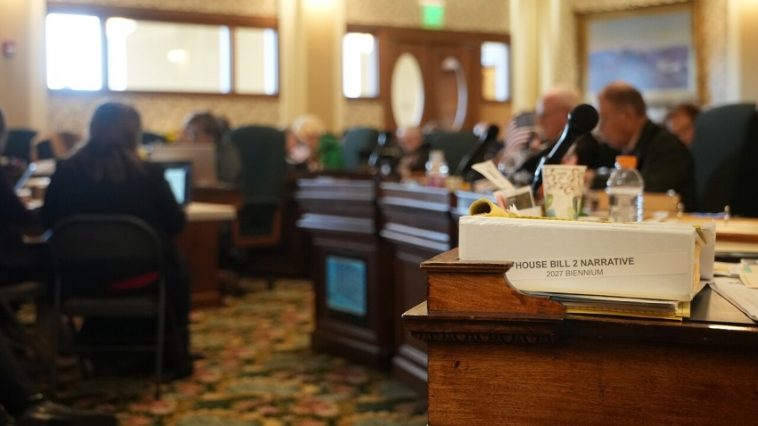Missoula, MT — After a lengthy debate, the Montana Senate has given initial approval to House Bill 2 (HB 2), the state’s main budget bill, with a narrow 27-23 vote. The vote was split along party lines, with all 18 Democrats and nine Republicans supporting the bill, while the remaining Republicans opposed it. The Senate’s action came just hours after the Montana House spent nearly a full day reviewing the bill in detail.
HB 2, which outlines a $16.6 billion budget for the next two years, includes approximately $5 billion from the state’s general fund. The budget reflects a 10% increase in total spending compared to the 2023 budget, and a more substantial 18% increase in general fund spending.
Senator Carl Glimm, R-Kila, the chair of the Senate Finance and Claims Committee, emphasized the significant spending hike during the debate. He argued that while the state entered the budget cycle with a large surplus, lawmakers had lost track of those funds, with the surplus now turning into a negative balance.
“We came in with a surplus — a very large surplus — and I think we’ve lost track of exactly where that surplus, which is now negative, sits,” Glimm said.
Despite these concerns, Senate leaders moved through the budget debate relatively quickly, dedicating just under three hours to reviewing the bill. The Senate largely avoided a line-by-line analysis, instead offering general overviews before debating a series of amendments.
During Thursday’s debate, lawmakers considered 22 amendments to HB 2. Most of the amendments were proposed by Republicans, led by Senate President Matt Regier, R-Kalispell, who sought to reduce what he and his colleagues saw as excessive government spending. However, only four amendments were approved, with three of them coming from Senate Democrats.
One of the most contentious amendments, sponsored by Senator Ellie Boldman, D-Missoula, aimed to reduce spending on contract nurses at the Montana State Hospital (MSH). Boldman’s amendment redirected funds to hire state-employed nurses instead, potentially saving $35 million for the general fund. The change was intended to reduce the reliance on expensive contract labor and improve the long-term staffing situation at the hospital.
“This amendment reduces contract labor, supports the state continuing to do what we asked them to do and hire state nurses at the hospital,” Boldman said. “It’s going to save $35 million to the general fund.”
But Republicans, including Senator Glimm, strongly opposed the amendment. Glimm argued that the reason the state had relied on contract nurses in the first place was because it was unable to attract and retain full-time staff for state positions. He warned that cutting back on contract nurses could harm the hospital’s ability to care for patients.
“If we’re concerned about the patients in the state hospital, you better not vote for this amendment, because they’re going to be left without nurses,” Glimm said.
Despite the debate, the Senate ultimately approved the amendment, reflecting a broader push to prioritize state employment over temporary contract positions, though it remains to be seen how this decision will affect staffing levels at the hospital in the long run.
While Republicans like Glimm voiced concerns about the overall level of spending, supporters of the budget argued that HB 2 is a compromise that addresses key needs across the state. Senate Minority Leader Pat Flowers, D-Belgrade, called it a “good compromise budget” that would meet the needs of Montanans in a “fair and meaningful way.”
On the other hand, those opposed to the budget, including Glimm, criticized it for failing to make more substantial cuts. Glimm predicted that Governor Greg Gianforte would likely veto parts of the budget in an effort to balance it.
“We’re passing everything under the sun,” Glimm said. “I imagine that the governor’s going to veto his way to a balanced budget, because he’ll have to. That’s a job that we’re supposed to do, but we aren’t doing it.”
The bill is set for another vote in the Senate before returning to the House. If the House agrees to the Senate’s amendments, the bill will be sent to the governor’s desk. If the two chambers cannot reach an agreement, the bill will be sent to a conference committee to reconcile the differences.
As lawmakers move forward with the budget process, all eyes will be on the remaining debates over specific funding areas, including healthcare staffing and community college allocations, as well as the possibility of further vetoes from the governor. The outcome of HB 2 will likely set the tone for Montana’s fiscal policies in the coming years.



